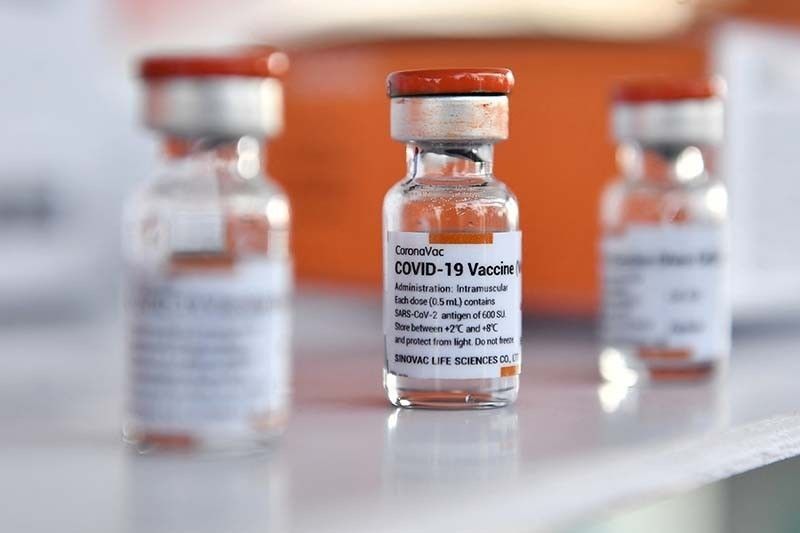400K Sinovac jabs going to NCR, Laguna, Bulacan, Cavite

MANILA, Philippines — The second batch of 400,000 Sinovac vaccines from China will be administered to health care workers in high-risk areas of the National Capital Region (NCR), Laguna, Bulacan and Cavite to strengthen the country’s health care system amid the COVID-19 pandemic, Malacañang said yesterday,
Presidential spokesman Harry Roque Jr. said the second batch of donated vaccines that arrived March 4 will be administered “as soon as possible” to the health care workers.
“It is being distributed so other health care workers will get vaccinated. Most of the 400,000 is allocated for NCR plus, including the provinces of Bulacan, Laguna, Cavite,” he said in Filipino, adding that this supply will soon run out as vaccination continues.
He pointed out that the combined 1.4 million vaccine doses donated by China and the World Health Organization’s COVAX Facility would still not be enough to cover for the three million doses needed to give the health workers two shots each.
“We have 1.7 million health workers. As long as the 1.7 million priority target is not yet completed, we will continue to vaccinate those in the priority,” Roque stressed.
He did not rule out the possibility that economic frontliners will become part of the priority sector, depending on the decision of the National Immunization Technical Advisory Group, which will have the last say on the deployment of vaccines that will arrive in tranches in the next few weeks.
As the number of those infected with COVID-19 continues to increase, the Union of Local Authorities of the Philippines yesterday urged the national government to ramp up the rollout of vaccines, warning that time is not on the country’s side.
Quirino governor and ULAP president Dakila Carlo Cua said the government should accelerate the delivery of vaccines to help prevent the virus from spreading in other parts of the country.
“Our only prayer is that they who see the bigger picture act faster, not only in terms of utilizing what we have but, more importantly, in producing what we need. Time is not our side,” he said in a statement.
The safety of over 100 million Filipinos, according to him, depend on the ability of government officials to act faster on securing vaccine supplies and administering these properly to the population.
“With each delay, we lose ground in the campaign to save Filipino lives,” Cua stressed.
He acknowledged that prioritizing Metro Manila and other areas with higher COVID-19 infections could help prevent COVID-19 from spreading to other parts of the country.
Faulty thermometer
Reacting to reports that at least 7,500 doses of the British-made AstraZeneca vaccines for the Bicol region’s health care workers were sent back to the Department of Health (DOH) office in Manila last Sunday because these had been packed in containers with defective thermometers, Sen. Francis Pangilinan said the Food and Drug Administration (FDA) should explain how an unlicensed logistics company was allowed to deliver the supply.
“According to the DOH, today our COVID cases is most likely to breach 700,000 and the active cases, 100,000. Then we get reports that thousands of doses of vaccines may be lost because an unlicensed logistics company was allowed to deliver them. Somebody should be accountable,” he said, noting that the law punishes violators with up to 10 years of prison time and up to P5 million in fines.
It was Pangilinan who caused Senate Committee of the Whole hearings on the government’s vaccine rollout with his Senate Resolution 594 in December 2021.
But Health Undersecretary Maria Rosario Vergeire insisted yesterday that the recalled supply is still in “usable condition,” citing the preliminary findings of the World Health Organization (WHO) and the United Nations Children’s Fund (UNICEF), which inspected the vaccines.
“We coordinated with the WHO, UNICEF and our DOH Logistic Team. We retrieved the vaccines and when they were inspected by the experts, they were found to still be potent and can still be used,” she said at a press briefing.
The 7,500 doses contained in a storage box received by the CHD-Bicol logged a temperature of more than 400°C – a temperature that is significantly higher than the storage requirements for AstraZeneca vaccine which is only at 2 to 8°C.
Vergeire pointed out that “upon a detailed review of the available evidence,” the WHO and UNICEF found that only the thermometer was faulty and that all other equipment and devices used to store and transport the vaccines were functional, thereby ensuring that all vaccine doses remain usable. – Emmanuel Tupas, Paolo Romero, Sheila Crisostomo, Rainier Allan Ronda
- Latest
- Trending


























